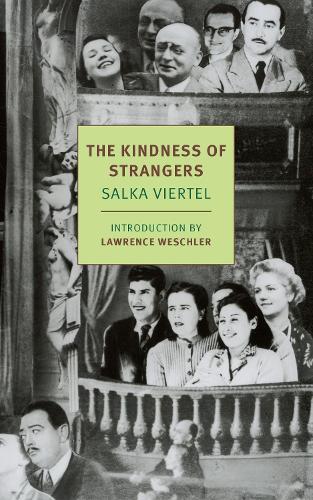
The Kindness Of Strangers
(Paperback, Main)
Publishing Details
The Kindness Of Strangers
By (Author) Salka Viertel
Introduction by Lawrence Weschler
New York Review Books
NYRB Classics
22nd January 2019
28th March 2019
Main
United States
Classifications
Physical Properties
Paperback
368
Width 135mm, Height 205mm, Spine 25mm
395g
Description
A memoir about showbiz in the early 20th century that travels from the theaters of Vienna, Prague, and Berlin, to Hollywood during the golden age, complete with encounters with Franz Kafka, Albert Einstein, and Greta Garbo along the way. Salka Viertel's autobiography tells of a brilliant, creative, and well-connected woman's pilgrimage through the darkest years of the twentieth century, a journey that would take her from a remote province of the Austro-Hungarian Empire to Hollywood. The Kindness of Strangers is, to quote the New Yorker writer S. N. Behrman, "a very rich book. It provides a panorama of the dissolving civilizations of the twentieth century. In all of them the author lived at the apex of their culture and artistic aristocracies. Her childhood . . . is an entrancing idyll. In Berlin, in Prague, in Vienna, there appears Karl Kraus, Kafka, Rilke, Robert Musil, Schoenberg, Einstein, Alban Berg. There is the suffering and disruption of the First World War and the suffering and agony after it, which is described with such intimacy and vividness that you endure these terrible years with the author. Then comes the migration to Hollywood, where Salka's house on Maybery Road becomes a kind of Pantheon for the gathered artists, musicians, and writers. It seems to me that no one has ever described Hollywood and the life of writers there with such verve."
Reviews
Thank goodness Greta Garbo encouraged her confidante Salka Viertel to write. With cameos by Kafka, Sarah Bernhardt, Eisenstein, Isherwood, and many others, Viertels memoir is humane, lightly ironic, and dizzyingly entertaining. Its a portrait of two lost worldsthe pre-Hitler German-speaking stage and the pre-CGI Hollywoodas well as the story of an actress and screenwriter who all her life was bold in love and passionate for the arts. Caleb Crain
Salka ends her book with a phrase about her incorrigible heart. It is this quality which sustains and ennobles all the artistic, intellectual, social and political events which her book narrates. It gives us a sense of what it is to be a true person. Without that core of warm humanity all the rest would be vanity.Harold Clurman,The Nation
From early childhood in the Polish Ukrainian sector of Austria-Hungary through her experiences in the German theater and Hollywood, Mrs. Viertel shares a full life, candidly and rewardingly.Kirkus Reviews
Salka is forgotten today. Biographies have been written about her genius husband Berthold, but Salka appears only as footnote in works about Greta Garbo. She deserves better, and her extraordinary story should to be read today by anyone interested in the German exile experience.Dialog International
Author Bio
Salka Viertel (1889-1978) was born Salomea Sara Steuermann in Galicia, then part of the Austro-Hungarian Empire, now Poland and the Ukraine. In the early part of her career, she acted in various theater companies, including Max Reinhardt's Deutsches Theater. In the late 1920s, Salka and her husband, Berthold Viertel, left Berlin for Hollywood, where Berthold wrote screenplays and directed films and Salka began acting in motion pictures. She befriended Greta Garbo on the set of Anna Christie and began to co-write screenplays for many of Garbo's films, including The Painted Veil and Deep Valley. With the onset of World War II, the Viertels decided to stay in California, and started a salon in their home for other emigres. In 1942, Salka was put on an FBI watch list and later her salon was dissolved under the inquisition of the Hollywood film industry. Despite being deemed a communist sympathizer, she was eventually permitted to return to Europe. She died in Switzerland.
